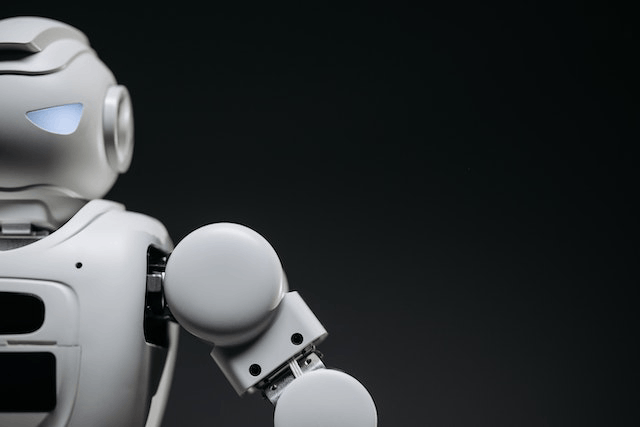ICS Learn

AI, Automation and How to Safeguard Your Job

11 July 2023 - 8 min read
2023 seems to have become the year of artificial intelligence and automation.
Artificial intelligence technology is rapidly growing in sophistication, offering businesses the chance to automate repetitive tasks and improve efficiency.
There’s a darker side to the march of AI and automation though: the human cost that comes with it.
A recent report by Goldman Sachs on the growth of AI suggested that up to 300 million jobs around the world could soon be affected by the rise of automation and artificial workplace. And, for what could potentially be the first time in recent memory, those affected are likely to be office-based, white-collar roles.
If, like millions of other workers around the world, you’re worried about the impact of AI on your job, don’t panic. In this blog we explore how you can safeguard your job.
Automation and work: an old problem without a solution
When it comes to the impact of technology on work throughout history, unfortunately there are winners and there are losers. Progress often comes through technological innovation but at the cost of upending lives and causing chaos.
In the late 18th century, the English countryside was in the grip of a moral panic.
The invention of revolutionary, steam-powered looms that could weave cloth faster than by hand and that could be used by less-skilled, poorly-paid factory workers meant that many skilled hand weavers lost their jobs, with no livelihood to support them or their families.
And they didn’t accept it lightly. A whole protest movement sprung up, with angry weavers – called ‘Luddites’ – roaming around the countryside and sabotaging any steam-looms that they came across. We still use the term ‘luddite’ to this day, referring, derogatory, to someone who’s suspicious of modern technology.
But, far from being the thoughtless mob that they’re often presented as, the Luddites were a desperate response to a question that remains unresolved to this day: how can we survive in a world that demands you work for a living but in which the job you are skilled in is replaced by a machine – in our case, artificial intelligence?
Here are some strategies that we think can help you to protect your career in the face of increasingly intelligent AI.

1. Research artificial intelligence and the latest advances
There’s been a lot of trumpeting in the media and press lately about artificial intelligence and automation, so you’d be forgiven for thinking that we were currently in the grip of a full-blown job crisis, with AI snatching jobs left, right and centre.
The truth is, we’re not at the point of mass layoffs just yet. Although, there’s certainly the potential for this to happen in the future. The technology behind AI is constantly evolving and getting better and as the months pass, AI training models are getting much more sophisticated as a result.
It makes sense then to keep track of how artificial intelligence is developing and specifically, how it is affecting your industry by doing some research from time to time. Has AI developed particular skills or abilities that are crucial to your own job? Are leading companies in your industry beginning to adopt AI in their processes and businesses? If so, how? Asking these questions periodically is a great way to stay informed about how safe your own job is and whether or not you should be taking steps to protect your position.
2. Check whether your job is at risk
We would be sugar-coating the truth if we told you that every single job was safe from the influence of AI. Scientists and researchers are predicting that most types of roles will probably be affected by the rise of artificial intelligence in some way.
There’s a difference between most jobs being affected and most jobs being replaced though.
Apart from the sheer amount of jobs that it threatens to make obsolete, one of the reasons that artificial intelligence is being spoken about so much is the fact that it’s a phenomenon that mainly affects white-collar workers.
Historically, working class, blue-collar jobs are the ones that have always been displaced by new technology. Think factory workers, secretaries and typists, textile workers, miners etc. These days however, it looks like white-collar jobs – predominantly office based – are about to bear the brunt of artificial intelligence.
It’s obvious that AI will completely displace some jobs. According to Tech.co, 10 of the most at-risk jobs could include roles like:
- Entry-level Administrators
- Data Entry Clerks
- Software Engineers and Coders
- Customer Service Reps
- Paralegals
- Copywriters and Content Roles (gulp, that includes the people writing this article)
- Graphic Designers
- Bankers and Accountants
- Traders
- Fact-Checkers and Proofreaders
All evidence to date seems to point to the fact that artificial intelligence isn’t likely to take every single job. In fact, there’s debate online between which roles are likely to be superceded, with commentators often taking opposite points of view. That’s because, truth be told, artificial intelligence will never be a replacement for the creativity, (positive) unpredictability and warmth of a human touch in a role.
3. If you can’t beat them, join them…
Many scientists, researchers and commentators are saying that fears about the widespread job losses and redundancies on a scale never before seen in the modern era are overblown.
They usually cite the fact that those working in roles replaced by artificial intelligence will simply transition to new roles that are created by the same technology.
If these predictions hold true, developing a new career in one of these fields could be a way that you keep ahead of artificial intelligence and maintain a job that can pay the bills.
A report in PC Magazine predicts some possible roles that could be created by the growth of AI. The article says these could be roles like:
- Prompt Engineer
- AI Trainer
- AI Auditor
- AI Ethics Advisor
- AI Managers
Here’s a slight disclaimer though. As you can see, these are very specialist jobs.
The unfortunate truth is that it’s highly likely the number of jobs that artificial intelligence makes obsolete will not be balanced by the new jobs that are created by it: just because there’s a finite number of new, specialist roles that can be created to service an AI industry. What’s more, the new jobs that are created, and the skills that will be required for them, are likely to be incredibly specialised and tech–focused, which puts them out of the range of the skillset of the average office administrator, for instance.

5. Improve your existing skills
Perhaps the most cost-effective, pragmatic and simplest course of action to respond to the threat of artificial intelligence impacting your career plans is to accelerate your own professional development. Refine your existing skills, develop new ones and specialise in an area that artificial intelligence is unlikely to have a major impact in.
This article on Big Think argues that there are three areas which AI cannot perform well, and will likely do so for the foreseeable future: creativity, dexterity and empathy. Jobs which use skills rooted in these areas will probably be relatively safe from most of AI’s impact.
When it comes to roles in human resources and learning and development, developing your skills so that you can take a more people-focused approach is essential. These roles are founded in the relationships between people at a company. Going back to basics and developing a specialist set of people and management skills will help you improve your resilience in the face of a threat from AI.
Studying a professional qualification can be a useful way to do this in a cost-effective, and relatively fast way. The CIPD Level 5 Associate Diploma in People Management or the CIPD Level 7 Advanced Diploma in Strategic People Management are useful qualifications if you’re working in HR and you want to enhance and specialise your skillset. The corresponding CIPD Level 5 Associate Diploma in Organisational Learning & Development and the CIPD Level 7 Advanced Diploma in Strategic Learning & Development are also useful if you’re looking to advance your career in learning and development.
Emphasise your humanity and develop your skills to stay ahead!
At the moment artificial intelligence is more of the artificial rather than the intelligent. Whilst it’s capable of performing some repetitive tasks quickly, it’s essentially a predictive algorithm (adept at mimicking) that draws most of its power from copying information available on the internet already. It lacks the nuance, warmth and basic humanity that characterises even the most basic jobs that we do. This could be the thing that ultimately saves your job.
If you think strategically and begin the process of improving your skills now, you can stay ahead of the machines and also develop your career at the same time.
Develop your career with a professional qualification that you can complete entirely online. Download your free course guide and get started.












